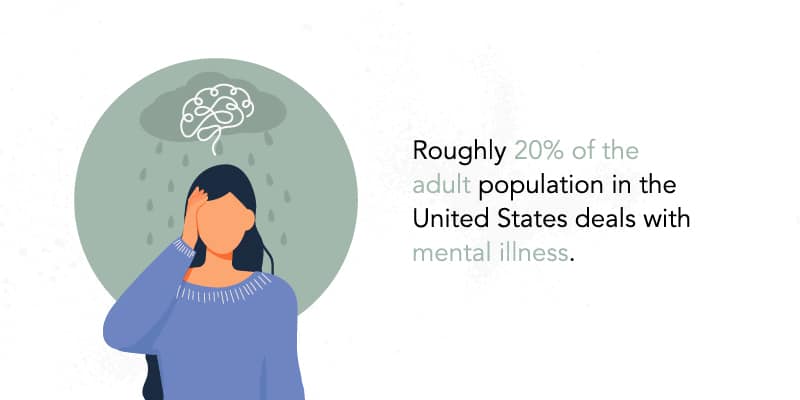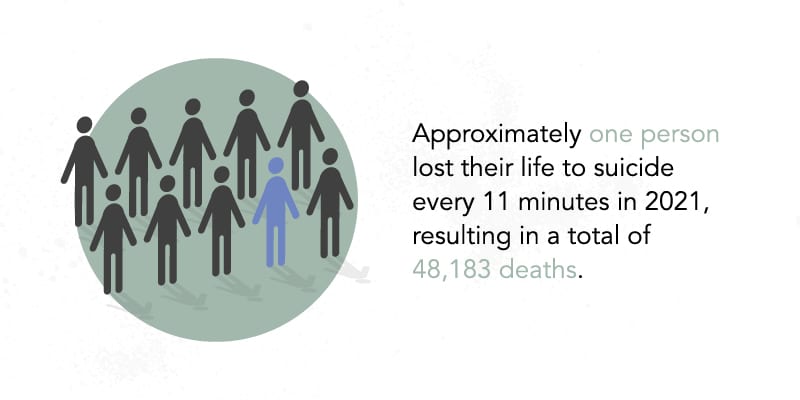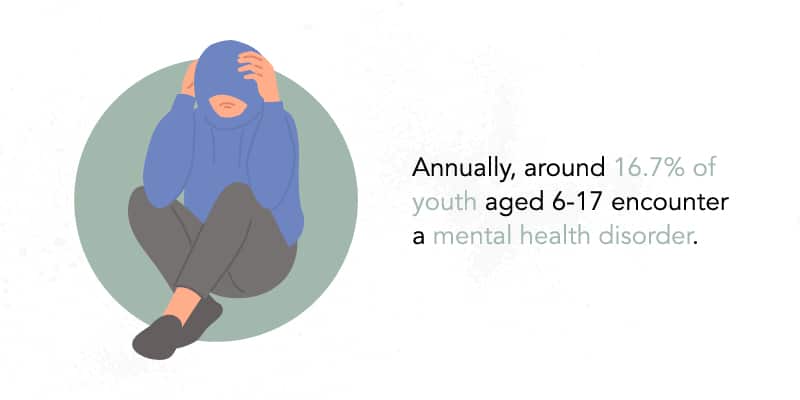What Is Mental Health?: A Comprehensive Guide
Recognize signs of mental health issues and learn when to seek help. Explore prevalent conditions like depression and anxiety and ways to reduce stigma.
What Is Mental Health?
Mental health refers to a person’s emotional, psychological, and social well-being. It affects how individuals feel, think, and act, and it plays a crucial role in their overall well-being.
Mental wellness is considered vital because it affects every aspect of a person’s life, including their ability to:
- Handle stress
- Make decisions
- Form relationships
- Cope with everyday challenges
It is estimated that mental illness impacts over 57.8 million American adults, highlighting the prevalence and significance of this issue.

The Importance of Mental Healthcare
With the rising numbers of people struggling with mental health symptoms, holistic and comprehensive healthcare is necessary for overall well-being. Individuals deserve to have the care and support they need during tough times, and Ethos Wellness is here to help.
How Do Mental Health and Physical Health Affect Each Other?
Mental and physical health influence each other in numerous ways. Here is how:
Impact of Mental Health on Physical Health
Mental health conditions, like anxiety and depression, can have substantial effects on physical health. This is how it works:
Stress and Its Effects
- Increased blood pressure
- Heart disease
- Weakened immune system
- Digestive problems
Mental Health and Sleep
Mental wellness conditions like anxiety and depression can disrupt sleep patterns. Lack of quality sleep can result in physical health issues, such as:
- Fatigue
- Deficiency in immune function
- Increased risk of diabetes and obesity
- Impaired cognitive function
Lifestyle Factors
Mental well-being struggles may lead to unhealthy lifestyle habits, such as:
- Poor diet
- Lack of exercise
- Substance use disorder
These lifestyle factors can contribute to physical health problems. These issues may include obesity, cardiovascular diseases, and compromised immune function.
Impact of Physical Health on Mental Health
Physical health issues can exacerbate or even create mental health symptoms.
Chronic Illness and Mental Health
Having a chronic illness can have a significant impact on mental health. It may lead to feelings of frustration, anxiety, and depression. Coping with chronic illness may require additional support, including therapy, for emotional support.
Pain and Mental Health
Physical pain, whether acute or chronic, can affect mental well-being. It may contribute to higher levels of stress, anxiety, and depression. Managing pain effectively can help alleviate the mental burden associated with physical pain.
Physical Activity and Mental Health
Physical and Mental Health: an Overview
What Is the Continuum of Mental Well-Being?
Recognizing mental health and mental illness as points on a continuum is important. It helps us understand that mental well-being is not a binary concept but that it exists along a spectrum.
The continuum of mental well-being includes:
Optimal Mental Well-Being
This refers to a state of overall well-being where individuals are emotionally stable. They experience good mental wellness consistently.
As a result, they can:
- Handle stress in a healthy manner
- Maintain positive relationships
- Lead fulfilling lives
Mild Mental Health Challenges
At this point on the continuum, individuals may experience occasional stress, anxiety, or low mood. These challenges may arise due to life events or temporary circumstances. They can often be managed with support and coping strategies.
Moderate Mental Illness
People at this level may experience ongoing mental health conditions. These issues impact their daily functioning. However, they can still maintain some level of independence with proper treatment and support.
Severe Mental Illness
This stage involves individuals with more significant impairments in their thoughts, emotions, and behaviors.
To manage their condition and improve their quality of life, individuals may require:
- Intensive treatment
- Medication
- Comprehensive support

Common Signs and Symptoms of Mental Health Issues
Mental health issues can affect anyone, regardless of age, gender, or background. It is important to recognize the following signs in order to seek help when necessary:
Persistent Sadness or Hopelessness
Feeling sad or hopeless for an extended period may indicate the presence of a mental health issue. Individuals experiencing these feelings often struggle to find joy in activities they once enjoyed. They also may struggle with maintaining a positive outlook.
Changes in Sleep Patterns
Difficulty Concentrating or Making Decisions
Mental wellness issues can also affect cognitive abilities. This makes it challenging to concentrate, make decisions, or remember details. Individuals may struggle with focusing on tasks, have a short attention span, or forget things easily.
Irritability or Aggression
Heightened irritability, mood swings, or outbursts of anger can indicate underlying mental issues. These emotions may appear disproportionate to the situation. This can contribute to relationship difficulties and social isolation.
Changes in Appetite or Weight
Significant changes in appetite or weight may be signs of mental health issues. Some individuals may experience a decrease in appetite and noticeable weight loss. In contrast, others may have increased cravings, leading to weight gain.
Withdrawal from Social Activities
Withdrawing from social activities or avoiding friends and family can be a sign of mental health struggles. Individuals may feel overwhelmed, anxious, or too exhausted to engage in social interactions.
When Should You Seek Help?
It’s essential to seek help when these signs and symptoms:
- Persist for an extended period, typically for two weeks or more
- Cause significant distress, impairment in daily life, or disruptions in relationships
- Lead to thoughts of self-harm or suicide

How Do Factors Such as Genetics and Environment Contribute to an Individual’s Mental Well-Being?
An individual’s mental wellness is influenced by a complex interplay of different factors. Understanding these variables can help identify potential risk factors and develop strategies for improving mental well-being.
Genetics: The Role of Inherited Traits
Genetics, or a person’s biological makeup, can influence mental health in various ways. Certain genetic factors can increase the vulnerability to developing mental health conditions, such as depression and anxiety.
Environment: Impact of Surrounding
The environment in which an individual grows impacts their mental health. Factors such as family dynamics and socioeconomic status often influence mental health.
While positive mental well-being is promoted by things such as a stable and supportive family environment, exposure to poverty or living in an environment where substance use is encouraged can increase mental health risks.
Life Experiences: Shaping Mental Wellness
Life experiences can have a lasting impact on mental wellness. The risk of developing mental health conditions increases if an individual is exposed to:
- Physical or sexual abuse
- Violence
- A natural disaster
What are the Most Prevalent Mental Health Conditions?
It is essential to understand the prevalence and impact of common mental health conditions, including the impact of poor mental health in adolescence.. Here is an overview of major conditions:
Depression
Depression is a pervasive mood disorder. It is characterized by persistent feelings of sadness, hopelessness, and a loss of interest in daily activities.
It can occur due to various factors, including:
- Genetic predisposition
- Hormonal imbalances
- Traumatic life events
Anxiety Disorders
Anxiety disorders encompass a range of conditions. They are characterized by excessive worry, fear, and apprehension.
Some common types of these disorders include:
- Generalized anxiety disorder (GAD)
- Social anxiety disorder (SAD)
- Panic disorder
What is an Anxiety Disorder?: A Closer Look
Bipolar Disorder
Bipolar disorder is a mental health condition that causes extreme shifts in mood, energy levels, and behavior. Individuals with bipolar disorder may experience:
- Manic episodes (characterized by elevated mood, increased activity, and impulsive behavior)
- Depressive episodes (marked by intense sadness, low energy, and loss of interest)
What is Bipolar Disorder?: A Closer Look
How Are Mental Health Conditions Diagnosed?
Professionals use a variety of assessment methods to diagnose mental health conditions. Some of the most common include:
Clinical Interviews
Health professionals conduct thorough interviews to gather information about:
- A person’s symptoms
- History
- Current challenges
These interviews provide insight into the individual’s emotional and behavioral patterns. They also help explore any potential underlying causes of their mental well-being concerns.
Psychological Tests
Experts in mental health use various tests to assess overall health. These tests can provide objective measures of the following:
- Cognitive abilities
- Personality traits
- Emotional well-being
Examples include intelligence tests, personality inventories, and depression or anxiety scales.
Observations
Professionals carefully observe individuals in various settings. The aim is to gain a better understanding of their behavior and functioning.
These observations can provide valuable information about:
- How a person interacts with others
- Their ability to cope with stress
- The presence of any significant behavioral patterns
Self-Reporting Questionnaires
Professionals often ask individuals to complete questionnaires that assess their symptoms. They allow professionals to gain insight into a person’s experiences.
These questionnaires provide standardized measures of various mental health conditions, such as:
- Depression
- Anxiety
- Mood disorders
Diagnostic Criteria: The Guiding Light
To diagnose conditions and symptoms, clinicians refer to diagnostic criteria. These standards are outlined in widely accepted references such as the Diagnostic and Statistical Manual of Mental Disorders (DSM-5). These criteria provide a structured framework for identifying specific conditions.
What Therapies Are Used to Treat Mental Health Conditions?
Effective treatment of mental wellness conditions often involves proven interventions. Some of the most common therapies include:
Cognitive-Behavioral Therapy (CBT)
CBT is a widely recognized therapy. It focuses on the connection between thoughts, feelings, and behaviors.
The goal of CBT is to identify and challenge negative thoughts and beliefs. It then replaces them with more realistic and positive ones. The goal is to improve mental well-being and cope with symptoms through structured sessions.
Dual Diagnosis Treatment
Dual diagnosis treatment addresses both mental and substance use disorders concurrently. Dual diagnosis treatment integrates therapies and interventions for both disorders.
It may include:
- Psychotherapy
- Medication management
- Support groups
- Relapse prevention strategies
Motivational Enhancement Therapy (MET)
MET is a client-centered approach. It focuses on increasing an individual’s motivation to change their problematic or unhealthy behaviors. This therapy is commonly used in the treatment of substance use disorders.
MET involves the following steps:
- Identifying and resolving ambivalence about change
- Setting specific goals
- Exploring the individual’s values and aspirations
Dialectical Behavioral Therapy (DBT)
DBT combines cognitive-behavioral techniques with mindfulness principles. It was initially developed to treat borderline personality disorder, but it is also effective in treating other mental health conditions, such as:
- Depression
- Bipolar disorder
- Substance use disorders
Meditation
Meditation involves training the mind to achieve a state of heightened awareness. Various forms of meditation reduce symptoms of anxiety, depression, and stress.
Regular meditation practice can:
- Enhance emotional well-being
- Improve focus and attention
- Promote overall mental clarity
Trauma-Based Therapies
Trauma-based therapy aims to help individuals who have experienced a traumatic event. A common evidence-based therapy for trauma includes eye movement desensitization and reprocessing (EMDR).
This helps individuals process traumatic memories and develop coping strategies. EMDR empowers individuals to regain control and find healing and recovery.
SMART Recovery
SMART Recovery stands for Self-Management and Recovery Training. It is a science-based alternative to traditional 12-step programs.
SMART Recovery encourages individuals to set specific, achievable goals and teaches coping strategies. It focuses on the principles of self-empowerment, self-reliance, and self-directed change.

How to Help Reduce Stigma Related to Mental Health Disorders
The stigma associated with mental well-being has undergone significant changes over time. Although progress has been made in recent years, there is still a long way to go.
There are multiple ways to help combat stigma, such as:
Education and Awareness
Education and providing accurate information about mental wellness and treatments help dispel misconceptions. Schools, workplaces, and communities should include this education in their programs. Online media should also promote realistic portrayals of mental wellness.
Open Conversations
Encouraging open discussions about mental well-being creates a supportive environment. Safe spaces where people can share their experiences without judgment normalize these discussions. Online platforms can facilitate these discussions through forums and support groups.
Personal Stories
Sharing personal experiences challenges stigmatizing beliefs. Real stories from individuals with mental health conditions humanize their experiences. They also show that anyone can be affected. Providing platforms for people to share their stories empowers them and promotes empathy.
Anti-Stigma Programs
Effective anti-stigma programs raise awareness, challenge stereotypes, and promote inclusivity. They use strategies like media campaigns, workshops, and training for healthcare providers. Evaluating their effectiveness and making improvements is vital.
Empathy and Support
Promoting empathy and support for individuals with mental health conditions is crucial. Family, friends, and communities should encourage understanding and compassion. Providing accessible support services is also essential for those seeking help.
What Role Do Schools, Workplaces, and Communities Play in Promoting Mental Wellness Awareness and Support?
Schools, workplaces, and communities play crucial roles in promoting awareness of overall health. Here is how:
Education
Schools help students understand feelings and stress through wellness and well-being lessons. This makes it easier for students to talk about their feelings and learn about their mental well-being.
Schools also have counselors who can talk to students about their problems. These counselors are trained to help with school and personal issues.
Employee Assistance Programs (EAPs)
At work, there are programs to help employees with personal problems. These programs are private and can help with stress, anxiety, or sadness.
Mental Health Training
Workplaces can provide training to employees and managers. This training helps individuals recognize signs of mental health issues. Managers also learn how to handle conversations about symptoms or conditions effectively.
Community Support Groups
Communities can make groups where people with mental health problems or their families can meet. These groups help people talk about their struggles.
Awareness Campaigns
Communities can teach people about mental well-being. They can have events and classes that help people learn about mental health.

How Can Ethos Wellness Help?
At Ethos Wellness, our experienced clinicians are here to listen to you. We provide one-on-one counseling sessions where you can talk about your challenges.
We provide:
Supportive Group Therapy
Join our group play therapy sessions where you can connect with others who may be going through similar experiences. These sessions create a safe space for sharing and learning from each other. You’ll find understanding and encouragement from others going through the same struggles.
Customized Treatment Plans
We understand that everyone is unique. Our team creates personalized treatment plans based on your needs and goals. This tailored approach ensures you get the help that suits you best.
Family Support and Education
We believe that involving your loved ones in your journey to better your mental well-being is essential. We offer support and education for families to help them understand and support you better.
Compassionate Care
Our team is dedicated to your well-being and is committed to providing compassionate care. You’ll find a supportive and non-judgmental environment at Ethos Wellness.
Start Your Recovery Today
Reaching out for help is a big step, and at Ethos Wellness, we’re here to support you every step of the way. Don’t hesitate to contact us and start your journey to improve your mental wellness today.
You’re not alone, and we’re here to help you feel better.
Resources
- https://www.nimh.nih.gov/health/statistics/mental-illness
- https://www.apa.org/news/press/releases/stress/2022/concerned-future-inflation
- https://www.ncbi.nlm.nih.gov/pmc/articles/PMC5579396/#:~:text=Stress%20can%20stimulate%20the%20autonomic,arrhythmias%20and%20subsequent%20myocardial%20infarction%20(
- https://www.ncbi.nlm.nih.gov/pmc/articles/PMC1470658/
- https://www.psychiatry.org/patients-families/sleep-disorders/what-are-sleep-disorders#:~:text=Sleep%20difficulties%20are%20linked%20to,the%20criteria%20for%20insomnia%20disorder.
- https://www.healthline.com/health/are-mental-illness-genetic
- https://www.ncbi.nlm.nih.gov/pmc/articles/PMC8639107/#:~:text=higher%20risk%20of%20developing%20mental,substance%20abuse%20%5B15%2D17%5D%3B
- https://www.who.int/health-topics/depression#tab=tab_1
- https://www.verywellmind.com/why-is-depression-more-common-in-women-1067040
- https://adaa.org/understanding-anxiety
- https://www.dbsalliance.org/education/bipolar-disorder/bipolar-disorder-statistics/


